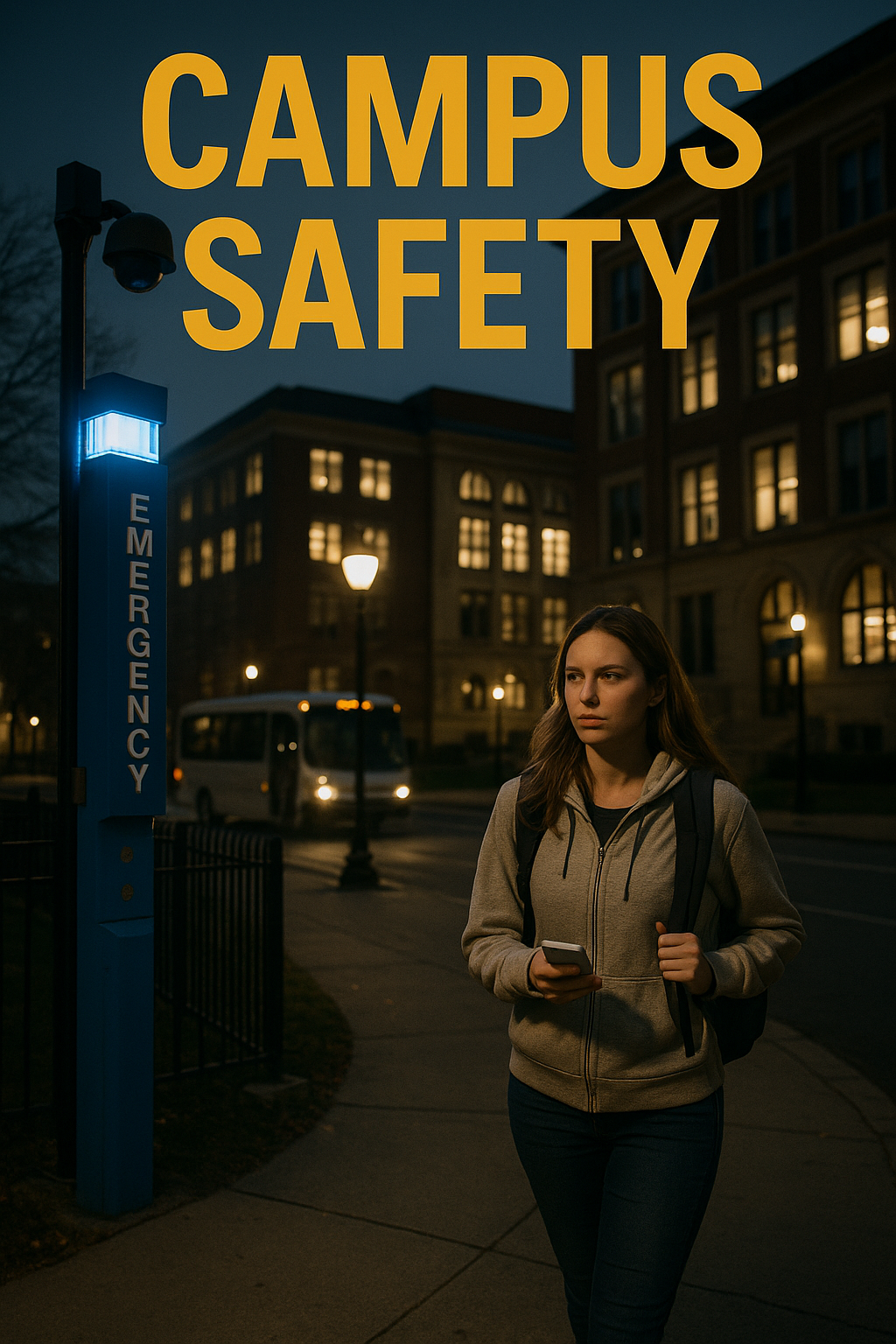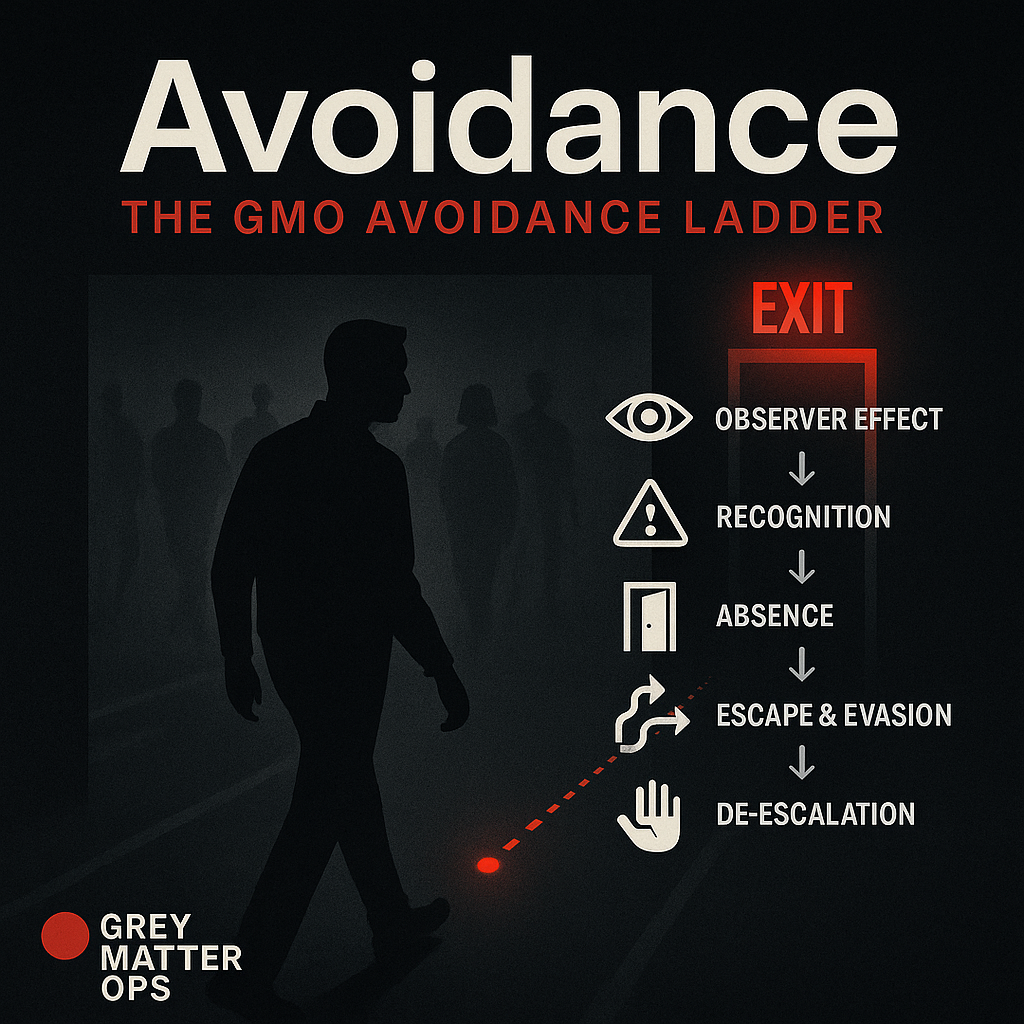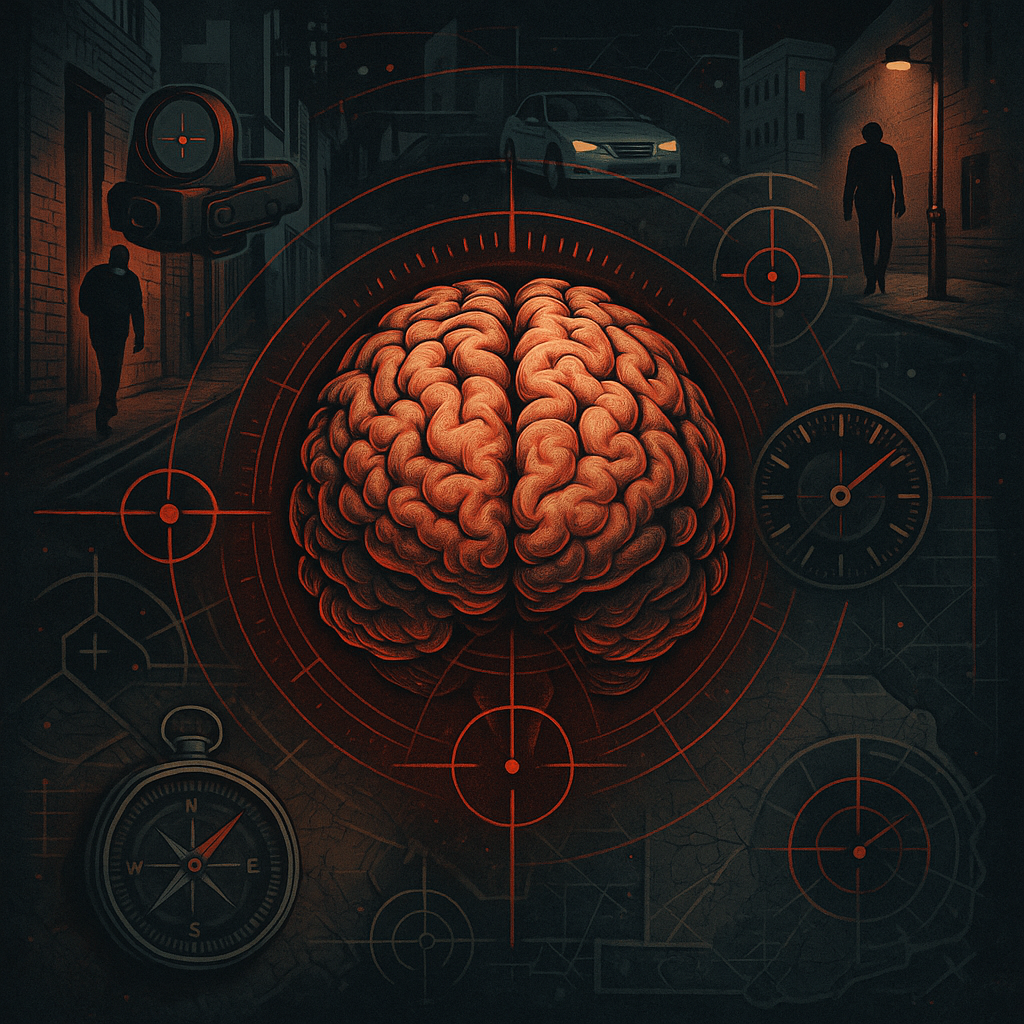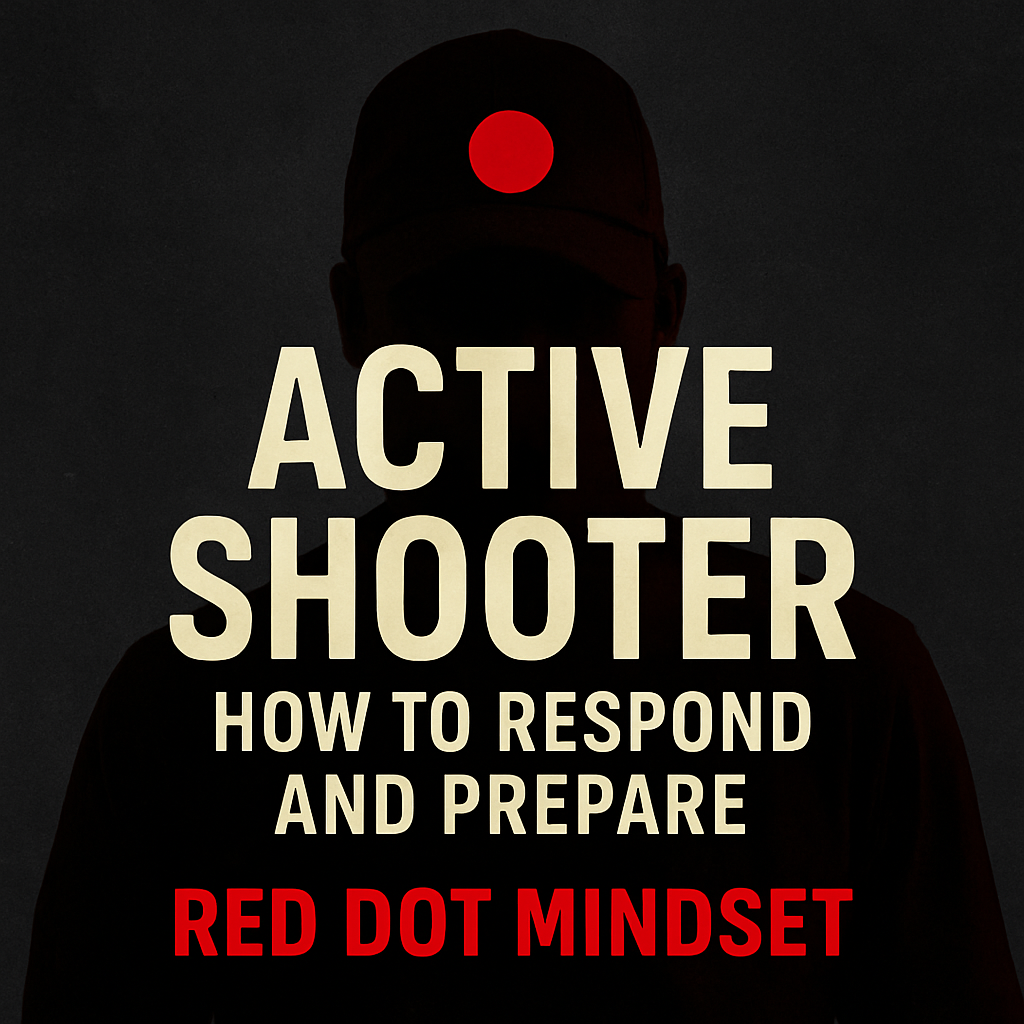Episode Transcript
[00:00:00] Speaker A: Welcome back to Red Dot Mindset, brought to you by Gray Matter Ops. Today's episode is inspired by a personal conversation our founder Mickey Midow had with a family member whose daughter is about to head off to college in Savannah, Georgia. That got us thinking. What advice would we give a first time college student, especially an introverted young woman, heading into an entirely new world.
[00:00:20] Speaker B: Exactly. This isn't just about orientation schedules or packing checklists. This is about survival skills, mental, social and situational. It's about preparing the mind before danger shows itself. That's the Red Dot mindset.
[00:00:33] Speaker A: And while we'll use scad, Savannah College of Art and Design as our primary example today, everything we're going to cover applies to any urban or suburban campus. Our goal is simple. Help new students, and especially introverts, feel safer, smarter and stronger as they start this next chapter.
Today we're taking a deep dive into the very real concerns you shared about college safety, building on the notes and questions you raised.
[00:00:55] Speaker B: So when we talk about safety in an urban campus environment, especially knowing some of those stats for places like scad, what does safe truly mean on the ground? Is it just, you know, avoiding crime, or is there something more we should consider?
[00:01:11] Speaker A: That's a really crucial question.
And for someone like Mickey's family member heading to SCAD, well, knowing that the zip code, 31401, that's where SCAD's main campus is, gets an overall crime grade of F from crimegrade.org I mean, that sounds alarming. It's ranked in the bottom 5% for safety nationwide.
[00:01:29] Speaker B: It does sound alarming. Yeah.
[00:01:30] Speaker A: But you know, like we often say at Red Dot, mindset, context is everything. This isn't about creating fear. It's really about informed awareness.
[00:01:37] Speaker B: Absolutely. That F grade doesn't mean you're automatically doomed or walking into some kind of unavoidable danger zone.
[00:01:42] Speaker A: Not at all. Right.
[00:01:42] Speaker B: What it really highlights is the critical need for proactive awareness. Our Gray Matter Ops analysis of that crimegray.org data for 31401 actually shows pretty varied risk levels within that one zip code.
[00:01:56] Speaker A: Oh, interesting. So it's not uniform?
[00:01:57] Speaker B: Not at all. In some spots, the risk of being a victim could be as high as one in five. But then in other pockets, like, say, the southeast end, it drops significantly, maybe down to 1 in 22.
[00:02:08] Speaker A: Wow, that's a big difference.
[00:02:10] Speaker B: It is. And this isn't just numbers on a page. It's showing a dynamic landscape. It really demands that you understand your immediate surroundings constantly.
It's about recognizing that safe Isn't some static state you achieve. It's an active, ongoing engagement with your environment.
[00:02:26] Speaker A: Okay, and to put some more meat on those bones, the data reveals specific threats, right? What should students really be aware of?
[00:02:35] Speaker B: Well, violent crime in that area averages about 7.6 incidents per 1,000 residents. Now, for a young person, especially a woman in an unfamiliar city, that's a significant number. To just be aware exists, but it's actually property crime that really dominates the statistics there. We're talking around 42 incidents per 1,000. That covers theft, burglary, car break ins, things like that.
[00:02:55] Speaker A: 42 per thousand. That's quite high.
[00:02:57] Speaker B: It is. And this translates financially to a projected $22 million cost of crime just in that area for 20, 25. Or put another way, about $99 per resident. That's almost double the national average. So it's not just about physical safety. It's also protecting your stuff, your finances.
[00:03:15] Speaker A: Which brings us to that core principle you mentioned, the one we teach at Gray Matter opsa.
Living left of bang. Can you explain that a bit more?
[00:03:22] Speaker B: Sure. Living left of bang. It means identifying and preparing for danger long before it escalates into a direct threat. It's about shifting your whole mindset from being react, like responding after something bad happens, to being proactive.
[00:03:35] Speaker A: Okay, proactive how?
[00:03:36] Speaker B: By building patterns of observation, Noticing subtle indicators. Maybe someone's posture seems off or their behavior feels out of place. It allows you to potentially disrupt a threat before it fully forms. It's the difference between, say, reacting during a mugging versus noticing someone suspicious a block away and deciding to cross the street or change your route before they even get close.
[00:03:57] Speaker A: Gotcha. And for a new college student especially, maybe an introvert who naturally observes things more closely. Anyway, that's a strength.
[00:04:05] Speaker B: It's a huge potential strength. Something to actively cultivate. You're already noticing things. Now it's about understanding what those observations might mean.
[00:04:13] Speaker A: Okay, so that covers the broader community context, but let's zoom in a bit. We talked about the surrounding area stats, which can feel daunting.
What about the campus itself?
How do schools like SCAD create a, well, safer environment within that challenging urban setting? Where do they actually excel?
[00:04:32] Speaker B: Yeah, that's where the concept of the institutional safety bubble really comes into play. And places like SCAD often have a pretty robust one. First off, they typically maintain 247 university police patrols. That's a constant, visible presence.
[00:04:47] Speaker A: Okay, patrols are good. What else?
[00:04:48] Speaker B: Buildings usually require swipe card access. Seems basic, right? But it's a fundamental barrier against unauthorized Entry. Then you've got networks of those blue light emergency call boxes scattered across campus.
[00:04:59] Speaker A: The blue lights. Yeah, I've seen those.
[00:05:00] Speaker B: And extensive security camera systems which act as both a deterrent and an investigative tool. Beyond just the physical infrastructure, there are services like ESKAD has its saferide shuttle system. It runs late, I think, until 3am which provides safe transportation when walking. Might feel risky.
[00:05:18] Speaker A: Oh, that's really useful, especially late at night.
[00:05:20] Speaker B: Definitely. And some schools even offer optional home checks for students living in nearby off campus apartments. These aren't just, you know, nice perks. They are distinct layers in a deliberately designed security framework.
[00:05:34] Speaker A: Which leads us to a really vital piece of advice from us here at Red Dot Mindset.
Always, always look up your college's Clery report. Can you explain what that is?
[00:05:44] Speaker B: Sure. The Clery act requires all colleges and universities that receive federal funding to publish an annual security report. It details crime statistics that occur on campus, in certain off campus buildings owned or controlled by the school, and on public property within or immediately adjacent to the campus.
[00:06:01] Speaker A: So it gives you the actual campus crime picture.
[00:06:03] Speaker B: Exactly. It's a transparent way to see what's really being reported. Right there. For instance, looking at SATS data, their recorded campus crime rate is way lower than the surrounding communities. Something like 13 incidents per 10,000 students.
[00:06:16] Speaker A: 13 per 10,000.
Compared to 42 property crimes per thousand in the surrounding area.
[00:06:22] Speaker B: See, it's a fraction. It gives you a much more specific, unvarnished look at the internal safety landscape rather than just the general neighborhood stats.
[00:06:30] Speaker A: That's incredibly important. Context.
[00:06:32] Speaker B: And for someone like Mickey's family member or any new student doing some prep before arriving is a huge anxiety reducer. Builds confidence right away.
[00:06:41] Speaker A: What kind of prep are we talking about?
[00:06:43] Speaker B: Before you even step foot on campus for orientation, download the campus map, get familiar with it. Proactively locate every single blue light box near your dorm, your classes, the library. Identify where the campus security office physically is.
[00:06:57] Speaker A: Okay. Map, blue lights, security office.
[00:07:00] Speaker B: Pinpoint all the shuttle pickup points for that safe ride system.
Understand how close your dorm is to the regular patrol zones. This isn't just busy work. Like ticking off a checklist.
[00:07:10] Speaker A: Right. It's about building familiarity.
[00:07:12] Speaker B: Precisely. It's about building a mental map of security. You're transforming what feels like an unknown, maybe intimidating environment into a familiar navigable space in your mind.
This proactive mapping, it's a core gray matter ops tenet. Translates directly into feeling more in control and prepared from day one.
[00:07:32] Speaker A: That makes a lot of sense. Okay, let's pivot slightly. Rideshare Services, Uber Lyft. They're everywhere, on and off campuses. Super convenient, especially for new students. Maybe without a car navigating a new city, they can seem like a lifeline.
[00:07:45] Speaker B: They definitely can be.
[00:07:46] Speaker A: But what are the absolute critical safety steps someone like this young woman heading to Savannah must take every single time she uses one? No exceptions.
[00:07:55] Speaker B: Okay, so from a gray matter ops safety briefing perspective, specifically for rideshares, we emphasize strict pre contact verification. Number one, you must always match the car's make, model A and D license plate before you even think about opening that door.
[00:08:11] Speaker A: We match everything. Got it.
[00:08:12] Speaker B: This isn't optional. It's mandatory. And here's a subtle but really critical communication tip. When the driver pulls up, don't immediately offer your name like, hi, are you here for Sarah?
[00:08:23] Speaker A: Okay, so what should you say?
[00:08:25] Speaker B: Instead? You ask them, who are you picking up?
If they respond with your name picking up Sarah, Then you've confirmed they're the right driver, but you didn't give away your identity first to potentially the wrong person.
[00:08:36] Speaker A: Ah, clever. I like that. Okay, what else? Once you're sure it's the right car.
[00:08:40] Speaker B: Get in the backseat. Always. And keep all your belongings, your purse, your backpack with you on your lap or right next to you. Not on the floor, not out of reach.
[00:08:48] Speaker A: Keep belongings close.
[00:08:50] Speaker B: Avoid sharing unnecessary personal information during the ride.
Keep the conversation light and impersonal. And crucially, don't wear earbuds or headphones. You need to maintain full situational awareness, including auditory awareness.
[00:09:04] Speaker A: No earbuds. Okay. And tracking.
[00:09:07] Speaker B: Absolutely. Always use the in app tracking feature. Most apps allow you to share your trip progress with a trusted contact.
Do it. Let someone know you're on route and where you are. These aren't just suggestions. They're non negotiables for maintaining control of.
[00:09:21] Speaker A: The situation and for maybe an extra layer of peace of mind, especially for parents who are worried. Are there apps or tools?
[00:09:29] Speaker B: Yeah, definitely. There are personal safety apps like Hollyguard or Lifesafe. These apps offer features like real time trip monitoring that you can share with trusted contacts. They also often have easy ways to trigger an alert if something feels wrong. Sending your location and a notification to your designated people, or even emergency services.
[00:09:47] Speaker A: So they kind of extend your safety net.
[00:09:48] Speaker B: Exactly. They extend that situational awareness bubble to your support network. It can be very reassuring.
[00:09:54] Speaker A: Okay, let's talk about another common campus transport bikes.
Super popular, especially on big spread out campuses like SCAD seems to be with buildings all over Savannah. They offer freedom, efficiency, huge advantages. Yes, but they also make you More vulnerable. Right.
[00:10:10] Speaker B: If you're not smart about it, significantly more vulnerable. You're out in the open, often moving quickly, maybe focused on navigating.
[00:10:17] Speaker A: So what's the tactical checklist for bike safety? What do students absolutely need to do?
[00:10:22] Speaker B: Okay, first rule. Stick strictly to well lit, designated bike paths whenever possible.
Never, and I really mean never, get tempted by those shortcuts through dark alleyways, unlit parks or sketchy areas. No matter how much time you think it might save, stick to the light.
[00:10:38] Speaker A: Got it?
[00:10:38] Speaker B: Yeah.
[00:10:38] Speaker A: What about securing the bike itself?
[00:10:40] Speaker B: Use a sturdy U lock, not one of those flimsy cable locks. Those can be cut in literally seconds with basic tools. A good U lock is a much stronger deterrent against theft.
[00:10:49] Speaker A: U lock, not cable.
[00:10:50] Speaker B: Okay.
[00:10:51] Speaker A: Night riding.
[00:10:52] Speaker B: If you have to bike at night, wear reflective gear, bright clothing, maybe reflective tape on your helmet or backpack. It's not just about traffic laws. It's about making yourself as visible as possible to cars, other cyclists, pedestrians. Reduces your exposure.
[00:11:07] Speaker A: Visibility is key. And headphones? Same rule as rideshares.
[00:11:10] Speaker B: Absolutely. Critically, never wear headphones or earbuds while biking. You need full audio awareness of everything around you. Cars approaching, people calling out, other potential hazards. Your ears are a vital part of your safety system.
[00:11:24] Speaker A: Makes sense. Anything else?
[00:11:25] Speaker B: For bikers, keep your phone easily accessible, not buried deep in a backpack where it takes 30 seconds to dig out. If you need to, call for help quickly, whether it's Campus Security or 91 1, time is absolutely of the essence.
[00:11:37] Speaker A: Easy phone access. Good tip.
[00:11:39] Speaker B: And all this ties back to what we at Gray Matter Ops call reducing exposure time. Think about it. For late night travel, using something like Saks Saferide Shuttle, remember it runs until 3am is an indispensable resource.
[00:11:51] Speaker A: Use the shuttle instead of biking late.
[00:11:53] Speaker B: Whenever practical. Yes. Learn its stops, learn its routes, and use it consistently, especially after dark. Or if you've been studying late and you're tired. By using the official monitored shuttle service, you significantly cut down the amount of time you're potentially exposed to risks out on the street alone.
It's a deliberate strategic choice to minimize your vulnerability.
[00:12:14] Speaker A: Okay, so we've covered physical safety, campus resources, transport. What about threats that aren't physical? You mentioned financial well being earlier. Let's talk about scams. Are they a big issue on campus?
[00:12:25] Speaker B: They're a huge issue. A kind of insidious, silent threat.
Financial predators specifically target students for a few reasons. Students are often distracted, maybe a bit overwhelmed with new responsibilities and often managing.
[00:12:39] Speaker A: Money on their own for the first time.
[00:12:41] Speaker B: Exactly. They're often trusting, and it might be their first time handling significant sums or dealing with things like tuition payments and financial aid directly. This makes them prime targets for deceptive scams.
[00:12:53] Speaker A: What kinds of scams should students like this young woman be particularly watchful for?
[00:12:58] Speaker B: Well, our Gray Matter Ops Intelligence sees several common ones repeatedly There are fake scholarship emails. They look official, promise you money, but then ask for an upfront processing fee or your bank details to release the funds. Classic red flag.
Legitimate scholarships don't ask you for money, right?
[00:13:15] Speaker A: Pay to get paid?
[00:13:16] Speaker B: No, never.
Then there are scammers who impersonate university officials. They might call or send urgent emails demanding immediate tuition payments, sometimes even threatening to suspend your enrollment if you don't pay right away via some specific, often untraceable method like gift cards or wire transfers.
[00:13:36] Speaker A: Wow. Creating panic.
[00:13:37] Speaker B: That's the goal. And we also see a lot of phishing texts or emails claiming your financial aid is suspended or there's a problem with your account. They tell you to click a link and verify your personal details. Login, password, Social Security number, which of.
[00:13:50] Speaker A: Course you should never do through a link.
[00:13:51] Speaker B: Never. The absolute rule here, something we constantly advise at Red Dot Mindset, is always verify independently.
Don't click links in suspicious emails or texts. Don't trust caller ID as it can be spoofed. Instead, go directly to the official university portal by typing the address yourself. Or call the official university financial aid or bursar's office number listed on their main website to confirm any request or supposed issue.
[00:14:16] Speaker A: Go direct verify first.
[00:14:18] Speaker B: That simple step can prevent enormous financial loss and incredible stress, especially for a student just starting out.
[00:14:25] Speaker A: What about academic safety? Is that linked?
[00:14:27] Speaker B: It is, especially in the digital realm. Rule number one Never ever share your login credentials for university systems. Not your student portal, not your email, not your course platform login. Not even with friends or roommates.
[00:14:39] Speaker A: Keep passwords private.
Seems obvious but important, crucial.
[00:14:43] Speaker B: And be really cautious with shared computers like in dorm, common rooms or libraries. Always log out completely when you're finished. Don't just close the browser window. Log out fully regularly. Back up all your academic files, papers, projects, notes. Losing weeks or month of work to a computer crash, malware or ransomware can be absolutely devastating academically and emotionally. Use cloud storage, an external hard drive, whatever works, but back it up.
[00:15:09] Speaker A: Good practical advice. Any other academic pitfalls?
[00:15:12] Speaker B: Be wary of those online tutoring or homework help sites that promise easy answers or pre written essays. Many are actually plagiarism japs designed to trick students into submitting work that isn't their Own, which can lead to serious academic dishonesty charges. Or they might be harvesting data.
[00:15:30] Speaker A: Stick to official university resources for help.
[00:15:32] Speaker B: That's always the safest bet. And this whole area scams urgent demands. Really brings Mickey Middaugh's core rule from gray matter ops into sharp brains. Focus.
[00:15:40] Speaker A: Remind us what that is.
[00:15:41] Speaker B: If someone's pushing you to act urgently, they're probably trying to bypass your better judgment. Pause, verify, then act. It's such a powerful internal compass for navigating any high pressure situation, whether it's financial, academic, or even social. That pause is critical.
[00:15:57] Speaker A: Pause, verify, act. I like that. Ah. Okay, shifting gears again slightly. Let's talk digital presence. You mentioned digital camouflage earlier, a concept from Red Dot Mindset. How does what you share online create risk, especially for maybe a more private, introverted student?
[00:16:16] Speaker B: It's a huge factor in today's world. What you post online, where you geotag yourself, who you tag, how you share your schedule. Even seemingly innocent updates can inadvertently create significant risk. For an introverted young woman who might naturally have a smaller immediate social circle but still uses social media, understanding this digital footprint is vital.
[00:16:36] Speaker A: Okay, so what are the specific actionable steps for better digital safety?
[00:16:40] Speaker B: First, turn off geotagging on your social media posts. By default. Don't automatically broadcast your precise location with every photo or update.
[00:16:47] Speaker A: Disable geotags. Got it.
[00:16:49] Speaker B: Second, consider delaying your posts. Instead of posting live from the cool coffee shop or the library. Maybe share the picture hours later or even the next day. This prevents someone from knowing where you are right now.
[00:16:59] Speaker A: Delay posting Smart Widow plans.
[00:17:01] Speaker B: Avoid broadcasting your specific plans publicly before you go out.
Don't post heading to the Forsyth park concert tonight. Wait until afterwards or share details privately with friends.
[00:17:13] Speaker A: Don't announce movements beforehand. What else should never be posted?
[00:17:16] Speaker B: Absolutely. Do not post your dorm room number online. Ever. Don't post your detailed class schedule. Don't even post about your regular walk or bike routes between buildings. These details, even if shared separately, can be pieced together by someone with bad intentions.
[00:17:32] Speaker A: Why is that so dangerous? Who's piecing it together?
[00:17:34] Speaker B: Well, unfortunately, predators exist even within college communities. They can use these seemingly harmless digital breadcrumbs. Your check ins, your schedule hints, your route complaints to pattern your movements. They learn your routines. Figure out when you're likely to be alone. Identify potential points of vulnerability. It's about being strategically private, even when you're participating in a public online world.
[00:17:56] Speaker A: Strategic privacy. That's a good way to put it.
[00:17:59] Speaker B: And for listeners who really want to dive deeper into this, especially how social Media can be exploited for things like behavioral tracking and even stalking. We cover it extensively in our deep dive titled Understanding Cutting through the Myths to Protect Yourself.
It offers some really critical insights for protecting your digital self.
[00:18:17] Speaker A: Definitely recommend checking that out.
[00:18:19] Speaker B: Yeah.
[00:18:19] Speaker A: Okay, let's circle back to something you touched on earlier.
Introversion.
Sometimes it's framed as a disadvantage, especially in a social college environment. But you said it's actually an advantage.
[00:18:31] Speaker B: A huge advantage. From a tactical perspective. If you're introverted, you're often not behind in the safety game. You might actually be ahead.
You naturally possess what we at Gray Matter Ops sometimes call elite tactical traits.
[00:18:44] Speaker A: Elite tactical traits? Like what?
[00:18:46] Speaker B: Think about it. Introverts often naturally notice details others miss. They tend to reflect deeply before speaking or acting. They assess situations quietly, internally, without necessarily needing that immediate external validation or interaction that can sometimes be distracting.
[00:19:01] Speaker A: Okay, I see that. Observation, reflection, quiet assessment.
So how can an introverted student like the one we're discussing actively leverage these strengths in a new, maybe overwhelming college environment?
[00:19:14] Speaker B: Great question.
First, use small talk strategically. You don't need to force yourself to be an extrovert or the life of the party. That's exhausting and inauthentic, right? Think of small talk not as deep connection, but as a tool, A way to maintain approachability, to seem connected to your environment, which actually makes you appear less isolated and potentially less of an easy target. It's about being present and observant, not necessarily performing.
[00:19:39] Speaker A: Use small talk as a tool, not a personality change. Okay, what else? Second, proactively build and keep a mental map of safe places for retreat. And think beyond just your dorm room. Where are the quiet corners in the library? Which student lounges feel comfortable and secure? Where's the campus security building? Again, having these pre identified safe havens gives you options if you ever feel overwhelmed, followed, or just need a secure place to pause and reassess.
[00:20:05] Speaker B: Mental map of safe zones. Got it. Third, consider journaling daily, even just a few minutes. This simple practice helps you process your experiences, track unusual feelings or observations. Maybe something felt slightly off on your walk home. And it reinforces that crucial situational intuition. It creates a feedback loop for your own awareness.
[00:20:26] Speaker A: Journaling to boost intuition. Interesting.
[00:20:29] Speaker B: And maybe most importantly, trust your instincts. That gut feeling. If something feels wrong, a person's vibe, a situation unfolding, a place, it probably is wrong, or at least warrants caution. For an introvert who is often naturally attuned to subtle cues and nonverbal communication, that internal alarm system is incredibly powerful.
Don't ignore it. Don't rationalize it away because you don't want to seem rude or paranoid. Trust it.
[00:20:53] Speaker A: Trust the gut. That's huge. But what if you feel that gut feeling, that doubt, but you're not sure what to do? You freeze up.
[00:21:00] Speaker B: That's where the Gray Protocol from Gray Matter OPSA comes in. It's a simple three step mental framework designed specifically for those moments of uncertainty when your instincts are firing, but confusion might set in.
[00:21:11] Speaker A: Okay, what are the steps? The Gray Protocol.
[00:21:13] Speaker B: Step one.
Observe without assuming. Just gather information. What are you actually seeing, hearing, feeling? Don't jump to conclusions yet.
[00:21:22] Speaker A: Observe. Okay.
[00:21:23] Speaker B: Step two. Prepare without panicking. Take a breath. Calm yourself. Assess your immediate options based on your observations. What can you do right now? Create distance. Alert someone. Seek a safer location. Make a quick mental plan.
[00:21:39] Speaker A: Prepare.
Got it.
[00:21:40] Speaker B: Yeah.
[00:21:41] Speaker A: And step three.
[00:21:42] Speaker B: Act without hesitation.
Once you've observed and prepared, commit to your chosen course of action. Move decisively. Whether it's walking away, making a call, crossing the street, entering a populated building, act on your plan.
This protocol helps cut through the freeze response and empowers effective action.
[00:22:00] Speaker A: Observe, prepare, act. Simple, clear. I like that. You know, listening to all this, if there's one single message we want listeners, and especially this young student heading off to college to take away, what would it be?
[00:22:11] Speaker B: I think it's this. You don't need to be fearless to be safe. In fact, fearlessness often comes from a lack of awareness. Which is dangerous, right?
[00:22:17] Speaker A: Fearlessness isn't the goal.
[00:22:18] Speaker B: No. What you truly need is to be trained to be equipped with knowledge like what we've discussed today. To be empowered by strategy, knowing the protocols, the safety tips, and to be confident in your own innate abilities, especially those keen observational skills many introverts naturally possess. It's about capability, not the absence of fear.
[00:22:39] Speaker A: Trained, equipped, empowered, confident. That's a powerful combination.
Okay, maybe let's wrap this up with a quick checklist summarizing the key takeaways from today's deep dive. Something easy to reference.
[00:22:51] Speaker B: Good idea. Here's a quick reference checklist pulling directly from our conversation.
[00:22:55] Speaker A: Okay, hit me first.
[00:22:56] Speaker B: Download and really learn your campus safety map. Make it part of your mental landscape before day one.
[00:23:01] Speaker A: Got it. Map learned.
[00:23:03] Speaker B: Know your shuttle stops and exactly where those blue light emergency boxes are located near your key areas. That's proactive security awareness.
[00:23:10] Speaker A: Shuttles and blue lights mapped.
[00:23:12] Speaker B: Consider installing a personal safety app like Hollyguard or Lifesafe. Extend your safety network.
[00:23:18] Speaker A: Safety app.
[00:23:18] Speaker B: Ooh. Always, always confirm rideshare identity using that specific question. Who are you picking up before getting in the rideshare.
[00:23:26] Speaker A: Verification Question memorized If you bike ride.
[00:23:30] Speaker B: Only on well lit paths whenever possible, use a U lock. Wear reflective gear at night and absolutely no headphones.
[00:23:37] Speaker A: Bike safety rules locked in.
[00:23:39] Speaker B: Ooh, watch out for those phishing emails and urgent tuition scams. Always verify official requests independently through official channels.
[00:23:48] Speaker A: Scam awareness activated. Verify everything.
[00:23:50] Speaker B: Practice digital camouflage. Delay social media posts. Avoid live geotagging. Keep personal details like dorm numbers and schedules offline.
[00:23:59] Speaker A: Digital camouflage engaged.
[00:24:01] Speaker B: Use your introvert strengths. Leverage that natural situational awareness, your tendency to reflect your minimal distraction levels. See them as tactical advantages and introvert.
[00:24:10] Speaker A: Strengths embraced as advantages.
[00:24:12] Speaker B: And finally, share your location quietly and consistently with at least one trusted contact at all times using your phone's built in features or a safety app.
[00:24:20] Speaker A: Woo. Location shared with trusted contact. That's a solid checklist.
[00:24:23] Speaker B: It covers the core bases we talked about.
[00:24:26] Speaker A: Absolutely. And you know, whether it's your family member heading specifically to ESCAD in Savannah or any student heading to any college campus, urban or suburban, anywhere, the principles, the mindset, the lessons we've discussed today are universal.
[00:24:40] Speaker B: They really are.
[00:24:41] Speaker A: The world doesn't really pause or magically get softer just because you're a new student trying to figure things out.
But armed with the right mindset, the right preparation, you don't have to be caught off guard. You can absolutely walk into this exciting new chapter with confidence, with capability.
[00:24:56] Speaker B: Well said. Stay smart, stay safe, stay ready, and never ever forget, Awareness is armor. It truly is the most powerful protective layer you possess.
[00:25:07] Speaker A: We'll catch you next time right here on Red Dot mindset, which is powered by Gray Matter Ops. And please remember, you're not alone in seeking out this kind of knowledge. You're simply preparing earlier and probably more deeply than most.
For those further insights into digital and social safety we mentioned, we definitely recommend listening to our Deep Dive Understanding, Stalking, Cutting through the myth to protect yourself.
Thanks for tuning in.




